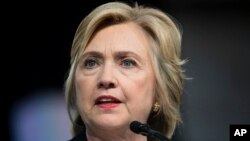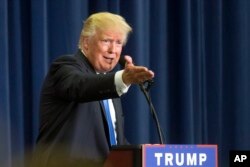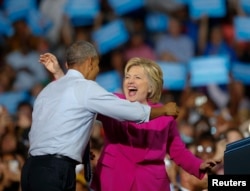It is a pivotal week for Hillary Clinton. Clinton is counting on an endorsement from rival Bernie Sanders on Tuesday in New Hampshire.
It’s a key step in what the presumptive Democratic presidential nominee hopes will be a refocus of her White House campaign to move beyond the controversy over her use of a private email account while secretary of state.
Clinton no longer has to fear a criminal indictment in connection with the email probe, but analysts caution the political fallout presents a continuing challenge that could last all the way to Election Day in November.
Politics after Dallas
In recent days, the presidential campaign has been pushed into the background as the country comes to grips with police shootings of black men in Louisiana and Minnesota and the assault in Dallas that left five police officers dead.
Clinton focused on national healing during a speech in Philadelphia. “No one has all the answers. We need to find them together. Indeed that is the only way that we can find them.”
The presumptive Republican nominee, Donald Trump, issued a video statement after the attack on the police officers in Dallas. “A brutal attack on our police force is an attack on our country and an attack on our families.”
Trying to put email flap behind
With the focus slowly returning to the campaign, Clinton hopes to move on after a difficult week focused on her use of a private email account.
The Clinton campaign was relieved with the announcement from FBI Director James Comey that no criminal charges were warranted against Clinton. But Comey also issued a stinging rebuke of Clinton’s handling of her email that could resonate for the rest of the campaign.
“There is evidence that they were extremely careless in their handling of very sensitive, highly classified information,” Comey said when he announced his decision not to recommend criminal charges against Clinton.
Trump wasted little time in seizing on the issue during a rally in Cincinnati, Ohio. “Hillary, crooked Hillary, so crooked,” Trump said to cheers from the crowd. “She made so many false statements. These are all lies. We say lie-lie, lie, lie. Lie! Dirty, rotten liar! Right?”
Welcome help from Obama
Clinton’s new campaign push will include a potentially valuable ally, President Barack Obama. They appeared together for the first time at a campaign event last week in North Carolina.
“I couldn’t be prouder of the things we’ve done together,” Obama said to the crowd in Charlotte. “But I am ready to pass the baton and I know that Hillary Clinton is going to take it.”
Republicans are hoping to exploit Clinton’s email controversy as symptomatic of a bigger issue, the public perception that Clinton is untrustworthy. That is not a new phenomenon, according to Gallup pollster Frank Newport.
“By far her dominant negative is that she is perceived as being dishonest. And that is not unusual. She had that perception back in 2008 when we asked Americans about Hillary Clinton.”
Republicans to stoke email issue
The email flap will remain a central piece of the Republican critique of Clinton, said Republican analyst Scot Faulkner.
“For somebody who has been in the public eye since she was the first lady of Arkansas, to have to keep reinventing herself and reintroducing herself shows that there are some fundamental flaws, independent of her failed diplomatic agenda.”
And while polls show that most voters see Clinton as untrustworthy, Trump’s ratings are even worse, setting the stage for a difficult choice for voters come November.
“It’s kind of a choice between stability in Clinton and radical change in Trump,” said University of Virginia analyst Kyle Kondik. “And voters may be a little bit more conservative, not in terms of being politically conservative, but just in terms of not wanting to take a big risk and I think that is Clinton’s best pitch, to say that Trump is too risky.”
Republicans now want a new investigation into whether Clinton lied to Congress about her email, likely ensuring the controversy will remain an election issue through November.
For her part, Clinton’s major focus will be pointing out Trump’s flaws and mobilizing the Obama coalition of young voters, minority communities and women to come out and support her in November.
“They will try to get Hispanics registered to turnout, they will try to get African-American turnout to be what it was when Obama was running. They will try to get young people to turn out and vote. But it’s a challenge,” said Gallup’s Frank Newport.
That challenge will take center-stage when Democrats gather in Philadelphia the last week in July for their national nominating convention.








